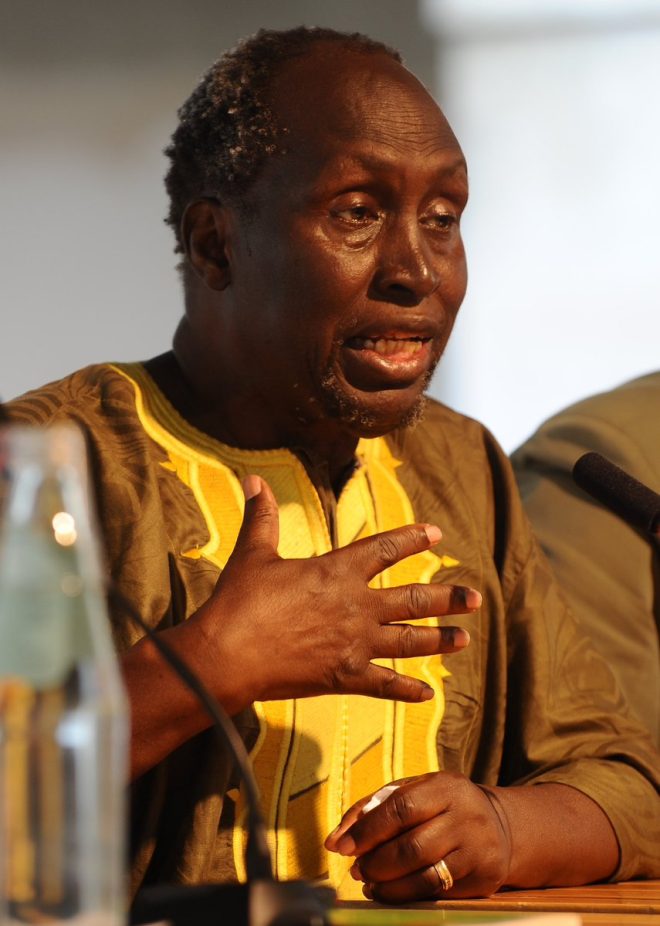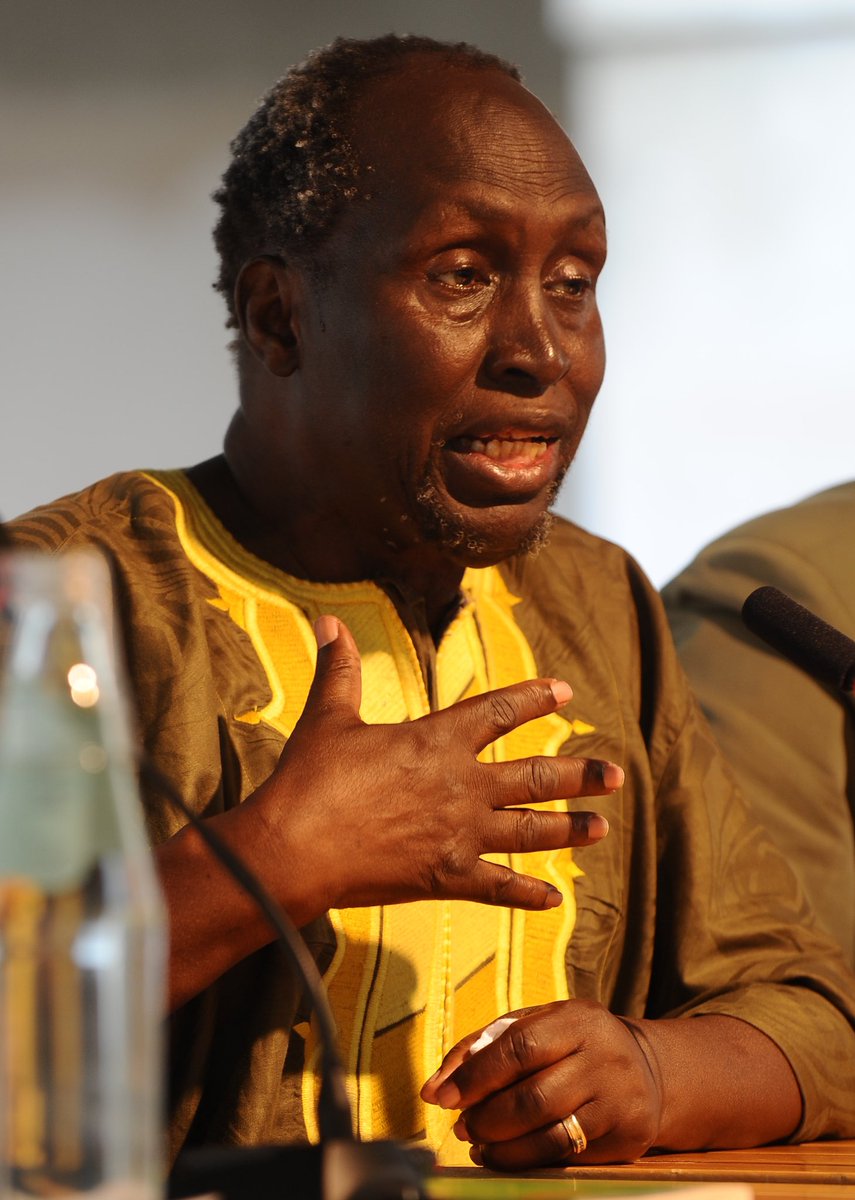
Death- Obituary news
Ngũgĩ Wa Thiong’o, the renowned Kenyan author and literary giant, has passed away in Atlanta, USA, leaving behind a rich legacy in the world of literature. Known for his powerful narratives and incisive social commentary, Ngũgĩ was a prominent figure not only in Kenyan literature but also in the global literary scene. His death marks a significant loss for the literary community and those who champion the causes of social justice and cultural identity.
### A Brief Biography
Born on January 5, 1938, in Kamiriithu, Kenya, Ngũgĩ Wa Thiong’o rose to prominence as a novelist, playwright, and essayist. He began his career writing in English but later shifted to writing in his native Kikuyu language, a move that was both a personal and political statement. His works often explore themes of colonialism, identity, and the struggles of the Kenyan people.
- YOU MAY ALSO LIKE TO WATCH THIS TRENDING STORY ON YOUTUBE. Waverly Hills Hospital's Horror Story: The Most Haunted Room 502
Ngũgĩ’s most notable works include “Weep Not, Child,” “The River Between,” and “Petals of Blood.” Each of these novels reflects the complexities of life in Kenya during and after colonial rule. His writing style is characterized by rich imagery and deep psychological insight, making his narratives both compelling and thought-provoking.
### The Legacy of Ngũgĩ Wa Thiong’o
Ngũgĩ Wa Thiong’o’s contributions to literature extend beyond his written works. He was also a vocal critic of political oppression in Kenya. His activism and commitment to social justice often placed him at odds with the government, leading to his imprisonment without trial in 1977. Following his release, he went into exile for several years, during which he continued to write and advocate for the marginalized voices in society.
His return to Kenya in the 2000s was marked by a renewed focus on the importance of language and cultural identity. Ngũgĩ argued that language is a crucial vehicle for cultural expression and that reclaiming indigenous languages is essential for the preservation of cultural heritage. This perspective has inspired many writers and activists in Kenya and beyond.
### Ngũgĩ and Kikuyu Tribalism
While Ngũgĩ is celebrated as a literary figure, he has also been a controversial figure in discussions about Kikuyu tribalism and political hegemony in Kenya. Some critics argue that his prominence is intertwined with the political dynamics of the Kikuyu community, the largest ethnic group in Kenya. This has led to debates about the representation of various ethnic groups in Kenyan literature and politics.
Despite these controversies, Ngũgĩ’s work has consistently emphasized the need for unity and understanding among different Kenyan communities. His narratives often highlight the struggles of ordinary Kenyans, regardless of their ethnic backgrounds, making him a beloved figure across various demographics in the country.
### The Impact of Ngũgĩ’s Work
Ngũgĩ Wa Thiong’o’s literary contributions have had a profound impact on African literature and the global literary landscape. His emphasis on writing in indigenous languages has inspired a new generation of writers to embrace their cultural roots, leading to a renaissance in African literature. He has also influenced academic discourse on post-colonial studies, language, and identity.
Moreover, his works have been translated into numerous languages, allowing his messages to resonate with readers worldwide. Ngũgĩ’s narratives challenge readers to reconsider their perspectives on colonialism, identity, and the socio-political landscape of contemporary Africa.
### Conclusion
The passing of Ngũgĩ Wa Thiong’o is a significant loss to the literary world and to the ongoing struggle for social justice and cultural recognition in Kenya and beyond. His legacy as a writer, activist, and advocate for cultural identity will continue to inspire future generations. As we remember his contributions, it is essential to celebrate not only his literary achievements but also the courage he demonstrated in speaking truth to power.
In conclusion, Ngũgĩ Wa Thiong’o was more than just a literary giant; he was a voice for the voiceless, a champion of cultural identity, and a profound thinker whose work transcended the boundaries of literature. His death is a reminder of the ongoing need for dialogue about ethnicity, identity, and the role of literature in shaping societal values. As readers and admirers of his work, we honor his memory by continuing to engage with the themes he passionately explored throughout his life. His influence will undoubtedly persist, reminding us of the power of words to effect change and foster understanding in a diverse and often divided world.

-The Literature giant, and award winning author, Ngũgĩ Wa Thiong’o, Has passed away in Atlanta, USA.
-RIP Thiong’o..And while being celebrated as great Author, this guy
Ngugi was THE FACE OF KIKUYU TRIBALISM, and Kikuyus POLITICAL Hegemony in Kenya.– He is among the… pic.twitter.com/YuYNnpUkpR
— Dr.Dennis Adison Ouma. (@DrDennisOuma) May 29, 2025
-The Literature giant, and award winning author, Ngũgĩ Wa Thiong’o, Has passed away in Atlanta, USA.
It’s a somber moment in the literary world as we reflect on the life and legacy of Ngũgĩ Wa Thiong’o, the renowned author who recently passed away in Atlanta, USA. His contributions to literature are monumental, and his influence extends far beyond the pages of his books. Ngũgĩ wasn’t just a writer; he was a voice for the marginalized, an advocate for the use of indigenous languages, and a critic of colonialism and neocolonialism.
Born in Kamiriithu, Kenya, Ngũgĩ’s journey began in the rich oral traditions of his Kikuyu heritage. His works often reflect the struggles and aspirations of the Kenyan people, making him a beloved figure in African literature. Through novels like “A Grain of Wheat” and “Petals of Blood,” he painted vivid portraits of Kenyan society and its complexities.
-RIP Thiong’o..And while being celebrated as great Author, this guy
As we mourn his passing, it’s essential to remember that Ngũgĩ was not only celebrated as a literary giant but also as a controversial figure in Kenyan politics and culture. Many view him as THE FACE OF KIKUYU TRIBALISM, a label that has sparked debate over the years. His deep ties to the Kikuyu community and his vocal stance on political hegemony often placed him at the center of discussions about ethnic identity and power dynamics in Kenya.
Ngũgĩ’s relationship with his Kikuyu roots is multifaceted. On one hand, he embraced his heritage, using it as a foundation for his literary work. On the other hand, some critics argue that his prominence has sometimes overshadowed the voices of other communities within Kenya. This duality has led to a rich yet contentious dialogue about the role of ethnicity in literature and politics.
Ngugi was THE FACE OF KIKUYU TRIBALISM, and Kikuyus POLITICAL Hegemony in Kenya.
Diving deeper, it’s crucial to understand the context within which Ngũgĩ wrote. His works emerged during a time of great political turmoil in Kenya. The fight against colonial rule was fierce, and Ngũgĩ, with his sharp wit and profound insight, became a crucial figure in the struggle for independence. His embrace of Kikuyu identity was not merely an assertion of tribal pride; it was a political statement against the colonial narrative that sought to suppress indigenous cultures.
However, with this visibility came criticism. Some argue that his prominence as a Kikuyu intellectual has contributed to the notion of Kikuyu political hegemony, which has been a point of contention in Kenyan politics. The Kikuyu community, historically one of the largest ethnic groups in Kenya, has wielded significant political power, and Ngũgĩ’s work has often been seen as reinforcing this narrative.
This complex interplay between literature and politics raises essential questions about representation and power. Is it fair to label Ngũgĩ as a proponent of Kikuyu tribalism, or does his work transcend ethnic boundaries? His literary achievements speak to universal themes of oppression, resilience, and the quest for identity, making them relevant to all Kenyans, regardless of their ethnic background.
He is among the
Ngũgĩ Wa Thiong’o stands among the giants of African literature, paving the way for future generations of writers. His decision to write in Gikuyu, his mother tongue, marked a significant shift in the literary landscape, challenging the colonial legacy of English as the dominant language of literature in Africa. This move was not just about language; it was a reclamation of identity and culture, a way to assert the richness of African narratives.
His advocacy for indigenous languages extends beyond personal preference; it’s a broader call for linguistic diversity and cultural preservation. Ngũgĩ believed that language shapes our worldview, and by writing in Gikuyu, he aimed to empower his community and inspire others to embrace their languages. This passion for linguistic identity has influenced many contemporary African writers who seek to explore their heritage through the written word.
In addition to his literary prowess, Ngũgĩ was an outspoken critic of political injustices in Kenya. He used his platform to address issues such as corruption, human rights abuses, and the marginalization of minorities. His works often serve as a mirror reflecting the societal challenges faced by Kenyans, urging readers to confront uncomfortable truths about their own realities.
The impact of Ngũgĩ’s work is evident not only in literature but also in the broader cultural discourse in Kenya and beyond. His writings have sparked conversations about identity, power, and the role of the artist in society. As we reflect on his legacy, it’s essential to acknowledge both his contributions and the complexities that come with being a public intellectual in a diverse and often divided society.
While grieving the loss of Ngũgĩ Wa Thiong’o, it’s important to celebrate the indelible mark he has left on literature and society. His works will continue to inspire future generations, encouraging them to explore their identities, challenge the status quo, and embrace the power of storytelling. The conversations he ignited about ethnicity, language, and politics will linger on as we strive for a more inclusive narrative that honors all voices in Kenya.
As we say goodbye to this literary giant, let’s carry forward his vision of a world where every story matters, and every voice deserves to be heard. Ngũgĩ Wa Thiong’o may have left us, but his words will continue to resonate, reminding us of the beauty and complexity of the human experience.
